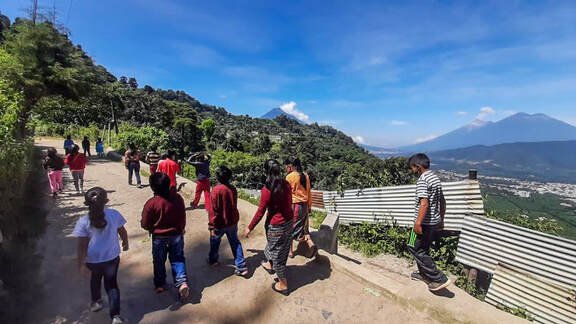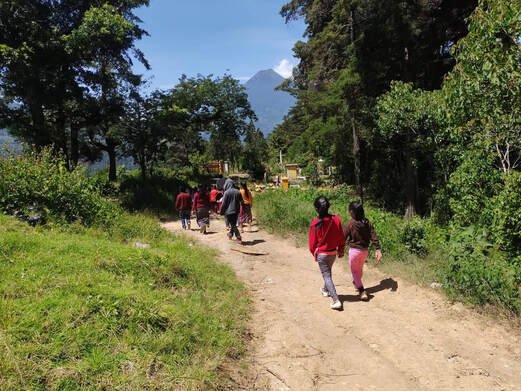Introducing REALgirl (SERniña)’s New Whole Family Healing Program
How we went from working with only girls to engaging whole families and communities
"If you were given $250,000 to advance gender equality and the empowerment of girls and women, what new and innovative idea would you design and implement?"
Those words, a prompt from the Fund for Innovation and Transformation (FIT) funded by Global Affairs Canada, stared at us on our respective computer screens. It was during the unprecedented pandemic “pause” of the planet that our team in Guatemala, and our two co-founders Danielle in Alberta and Anea in California, pondered the transformative potential of a $250,000 grant opportunity.
Never had we been more grateful for Zoom, which bridged the gap of well over a thousand geographical miles between us all; from rural Alberta to Northern California to the hills of Guatemala. A $250,000 grant was something we had only dared to dream of in our first several years, as we worked passionately every day to implement a customized version of our REALgirl Empowerment Program in Guatemala, one of the most dangerous countries in the world for girls and women to live.
Ever since we launched “SERniña” (to be a girl) in 2014, as the REALgirl Foundation’s first-ever Latin American branch, in Guatemala, we had survived on a shoestring budget, funded largely by an annual fundraiser in a small Hollywood Comedy Club, our generous family members and friends, small-sized one-time grants, and the sheer determination to advance the empowerment of girls.
In 2017, Jennifer Buffet’s NOVO foundation (now part of the TIDES Foundation) gave us our first big grant in the amount of $60,000., which enabled us, in just a few short years, to hire and train a larger deeply committed local team of facilitators and earn the respect of the Guatemalan Ministry of Education and an ever-increasing number of local partner schools.
Now, faced with this seemingly “too good to be true” opportunity offered through FIT and Global Affairs Canada, in concert with our Canadian partner, REAL Humanitarian, we dared to dream bigger.
What new and innovative idea would we implement if we had the resources to do so? In some ways, our whole approach to girls’ empowerment has always been “innovative”. By design, our program has been unique in our commitment to addressing the root causes of the disempowerment of girls and women. As opposed to just trying to counter messages of misogyny with surface messages of “girl power”, our approach is built on bringing awareness to the myriad messages deeply embedded in the patriarchal paradigm that seep through into our family systems, cultural norms, school curricula, religious institutions, and media. We have always believed that meaningful and lasting change is only possible when the root of the problem is brought into the light, looked at through a critical lens, and addressed.
When we first started SERniña, like many girls’ empowerment-focused organizations, we worked exclusively with girls. But we quickly learned that advancing the empowerment of girls can only go so far when you work exclusively with girls. In fact, it is not only less effective to work with girls exclusively, but also, potentially dangerous, and even life-threatening, to provide girls with language and tools of empowerment without also educating boys and other community members about the limitations and dangers of gender inequity. Consequently, we added boys’ programs to our SERniña offerings in 2017.
Now faced with a pandemic, lockdown, and countless unprecedented challenges, we reflected on how we could further evolve our mission, to better meet the needs of the girls we served. For years, we have seen the need to go deeper: to diversify our services and reach more individuals in the lives of the girls in our programs. Through the potential support of FIT, we began to envision a deepening of our existing programs to access, educate, and support so many other members of a girl’s world, and launch a fully “holistic” program. We engaged in many “Imagine if…” conversations about how much more impactful our work could be if we expanded our mission to include whole families of girls. After all, changing a long-standing status quo demands that all the participants who are maintaining it be educated and guided to co-create a new construct that will benefit more members of our human team.
While we began ruminating on a more “holistic” approach to our work, the need to do so was also becoming ever more apparent: rates of gender-based violence in the homes of our girls, as well as around the world, were on the rise, and the pandemic threatened unprecedented rates of dropout and teen pregnancy rates for girls.
As needs increased, the girls and families we served began to advocate more and more for increased support. Mothers were asked to join in on their daughter’s workshops. Teachers were asking to learn about navigating incidents of violence. And across the board, individuals were requesting more in-depth individual support for victims of violence.
Guided by the glaring needs and requested support from the local communities we serve in Guatemala, as well as the inspiring prompt from the Fund for Innovation and Transformation, our Holistic Three-Pronged (H3P) Approach to Violence Prevention and Response (“Whole Family Healing Program”) was born. In practice, it would engage whole families and provide families and communities-at-large with in-depth, long-term, and holistic support programs.
After a rigorous application process, in March 2021 our dream came true, and we were awarded $242,000 CAD of funding to implement and test our innovative Holistic Three-Pronged (H3P) Approach in Guatemala.
Our Fund for Innovation & Transformation Testing Project
For our FIT Testing project, we set out to test the impact and effectiveness of a holistic, family-centered, gender equity-focused violence prevention and response program in Guatemala.
A key innovation in the design of our project was for it to be “Holistic” in a multi-faceted sense, to address gaps we had identified in existing programs and services. Specifically, our FIT Testing Project was:
Holistic in Reach: Through the support of FIT we were able to run programs and engage all members of participating families (boys, girls (children and teens), mothers and fathers), and key community members (community leaders, partner organizations, and educators).
Holistic in Offerings: For the FIT project, we continued our proven weekly workshop program and also tested out new and more in-depth approaches, including individual, couple’s, and family therapy, healing sessions, skill-development sessions, and holistic violence response services.
Holistic in Content: A defining feature of the REALgirl/SERniña program is our holistic curriculum which covers all of the major challenges and needs impacting the lives of our participants, as opposed to just one subject area. For the FIT Testing Project, we implemented our existing holistic curriculum, and also further enhanced it by embedding more healing and empowerment components focused on restorative justice and traditional Mayan healing modalities.
As FIT focuses on short-term, high-impact projects, our FIT Testing Project had to be completed in 15 months, allowing for 6 weeks of baseline evaluations, 12 months of program implementations, and 6 weeks of online evaluations and reporting.
Knowing that to see the lasting change we must go deep, we focused our “FIT Project” on one community, El Hato Guatemala. We chose El Hato as it was one of our longest-standing community partners and we had been running workshops in partnership with the local school since 2014. El Hato is a small, rural, Indigenous mountain-side village with a population of roughly 1,800 people. The average monthly household income is less than $6.75 USD per day, putting households in El Hato well below the poverty line. Patriarchal and machismo attitudes and behaviors are deeply engrained within El Hato society and families; less than 60% of women have any source of income, 36% of pregnancies happen are to teen girls, and of all our partners, we saw some of the highest rates of gender-based domestic violence among our El Hato families.
The Impact
Overall, in fifteen short months, our FIT Testing Project reached 290 individuals directly and provided holistic support to 27 families.
At the start of the project, we set out to answer one key question: “Could we better advance the empowerment of girls and women and reduce gender-based violence and gender inequality, if we began working more holistically and engaging whole families?”
To answer this question, we believe the numbers speak for themselves. After the FIT project…
The number of reported cases of violence among participants dropped by 45%
62% of participants reported overcoming a situation of violence as a result of the program
79% of participants reported experiencing less violence in their homes after the program
90% of the women who participated have reported taking concrete action toward their empowerment
Through this, we wanted to prove that the most effective way of advancing the empowerment of girls was by engaging not just girls, but all individuals who are impacting the world of a girl and have the power to shrink or expand the possibilities of how she could show up in the world. Overall, the quantitative data, qualitative assessments, and day-to-day community observation proved the increased impact and effectiveness of when we work more holistically by engaging whole families and offering all family members more expansive support, including therapy, workshops, and violence response services.
Wrapping Up & Moving Forward
Though our FIT Testing Project wrapped in 2022, our new ‘Holistic Approach’ was only just getting started. Based on the unprecedented positive results of this pilot project and the generosity of new grants and donors, we are thrilled to now be offering this more holistic model throughout 80% of our partner communities and aim to implement it in 100% of them by 2024.
Stay tuned as we continue to share other key learnings, findings, and innovations from our FIT Testing Project in the coming weeks.



